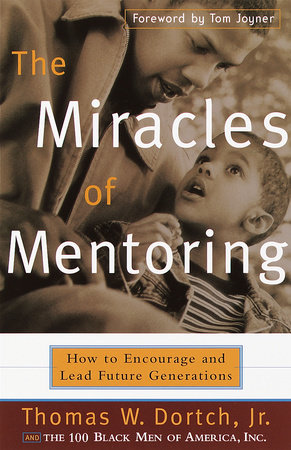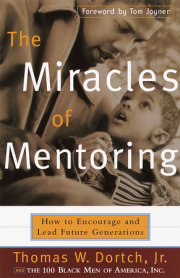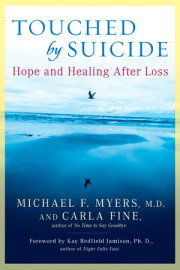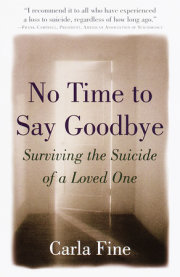Chapter One
Real Men Giving Real Time: Mentoring the 100 Way
Man shall not live by bread alone. Man must live by faith—faith in himself and faith in others.
Dr. Benjamin E. Mays
I was born up north—northern Georgia, that is—in 1950. About seven miles south of the South Carolina state line, Toccoa, my hometown, was a quiet little place of about 18,000 people. With acres and acres of woodlands and the beautiful Toccoa Falls, it felt like it was "God's country." Most people had jobs at the foundry or the furniture factory or owned their own businesses.
Blacks made up about 10 percent of the population and we lived in a tight-knit community, with our own stores, restaurants, churches, and schools. The creek that separated our part of town from the white section ran through the back of my parents' property, and my friends and I often leaped across to play with the white kids or they crossed to play with us.
Somehow, in spite of the signs that read for whites only and no coloreds and the fact that we could only get served at the back door of some places in town, we did not have the sense that we were inferior. I remember going to the movies on Saturday nights and thinking that we were lucky to be sitting up in the balcony—the section designated for blacks—because there was no one above us who might accidentally spill soda pop on our heads or throw their candy wrappers over the railing.
It was not that we were blind to the injustice of segregation or immune to the hurt and the anger it caused—it was that we were not poisoned by feelings of inferiority and powerlessness. Yes, it was painful and frightening to drive through an all-white county on the way to a basketball game and see the words nigger, don't let the sun set on your black behind scrawled in red paint on boards and fences along the road, but we had been taught by our elders that the ugliness lay not in us but in the person who had written those words.
The adults in the community were like a security blanket wrapped around us. They might have had their own personal anger or bitterness, but they never passed it on to us kids. My mother—a wise philosopher—used to say, "There are those of your color who are not of your kind, and those of your kind who are not of your color. You've got to judge people on the basis of their character, not their skin."
The black community of Toccoa was really a village looking out for its own. The adults were concerned that the young people should do the best they could, and each one of them played a part in making sure they would. Our parents, teachers, community, and religious leaders instilled in us a sense of self-pride?if we worked hard, we could do anything.
I knew that I had to work twice or maybe three times as hard to get where I wanted to go in life. But that did not make me think that I could not get to where I was heading. It was not important that our desks were not as new as the ones in the white school or that our books were tattered. We were in the classroom to learn, and we had teachers who cared about us and gave us everything they had. It was thanks to them that in 1968 I graduated salutatorian of the last segregated class of Whitman Street High School and went on to Fort Valley State University—a historically black university that wanted me for my mind, not my ball playing ability, as was common for larger institutions.
Our elders taught us by example. They came together as a community to make their voices heard politically and economically. I learned many important lessons about the power of coalitions and the mighty dollar as I helped pass out election fliers and listened to my father and other community leaders talk about collective action. They were my inspiration as I became president of the student government at Fort Valley and then got involved in local and national politics.
And let me tell you, I was so filled with pride when I returned years later to that same county in Georgia where I had been warned as a high school student to not let the sun set on my behind. Here I was, one of Georgia U.S. Senator Sam Nunn's chief aides, called in to help resolve racial tensions following a local civil rights demonstration. I brought everything my community had taught me to that negotiating table and celebrated the moment not only as a personal validation but also as a victory for that whole village that helped raise me.
The elders of Toccoa had all suffered the injustices of Jim Crow, but they recognized that every challenge is an opportunity. They taught us that the courage to face great challenges creates great warriors. And they encouraged us to go after our dreams with great courage. If the front door is locked, they would tell us, go around to the back. And if the back door is locked, get in through the window. But most important, once you get in, open the door for those following you and help them in.
It is this way of looking at the challenges we faced as African Americans that shaped my generation. We were encouraged to seize the opportunities that the Civil Rights movement was creating. We were taught to make opportunities for ourselves and for others. It is this approach to creating social change that is the guiding principle of the 100 Black Men of America, Inc.
"If you look at the members of the 100," says Lenny Springs, senior vice president of First Union Bank and the founding president of our Charlotte, North Carolina, chapter, "someone in their lives recognized them and told them they could achieve and be someone if they believed in themselves. I know people did that for me. I can't forget that. I won't forget that. I give back because someone paved the way for me."
That is what the 100 is all about: real men giving real time. The way was paved for us by our parents, our teachers, our mentors, our ancestors. It was paved by the people who gave their hearts and their lives to demand for African Americans the human rights guaranteed to all Americans by the Constitution. We have not forgotten. We will not forget. And we will give everything we have to pass on to our children and the generations to come the courage to become great warriors by helping them make opportunities of the challenges they face.
In the Time of Struggle, a Blueprint for Success
"I have a dream," Dr. Martin Luther King, Jr., proclaimed from the steps of the Lincoln Memorial on August 28, 1963, "that my four little children will one day live in a nation where they will not be judged by the color of their skins, but by the content of their character."
As Dr. King addressed these historic words to the 200,000 people who had gathered in the Tidal Basin at the climax of the March on Washington—the largest rally of the civil rights era—the One Hundred Black Men were making a difference in New York City. The organization's founders were of the strong belief that in order to ensure the long-term success of the struggle for civil rights, African American youth had to be ready to make the most of the opportunities that would be created by the movement. They recognized very early on that they would have to redefine the concept of a "village." And in order to do so, they went about building coalitions, partnerships, and a broad base of support to focus a tremendous amount of resources on youth development. They came to embody Ralph Ellison's philosophy that "democracy is a collectivity of individuals."
The 100 is now 10,000 strong. Our volunteer members give openly and generously of their time, their energy, and their hearts. They do so because they know each of them has beaten the odds and it is their obligation to stay true to the civil rights motto of "each one teach one, each one reach one."
Our membership includes, along with many others, such distinguished men as:
•Hank Aaron, Baseball's Home Run King
• Dennis Archer, Mayor, City of Detroit
• Bill Campbell, Mayor, City of Atlanta
• Kenneth Chennault, President, American Express
• Johnnie Cochran, Attorney
• Bill Cosby, Philanthropist and Entertainer
• Earl Graves, Publisher and CEO of Black Enterprise Magazine
• Richard Parsons, President, Time Warner
• Honorable P. J. Patterson, Prime Minister of Jamaica
• John Lewis, U.S. Congressman
• Kweisi Mfume, President and CEO, NAACP
• Alonzo Mourning, Miami Heat of the NBA
• Colin Powell, Retired Chairman, Joint Chiefs of Staff
Copyright © 2001 by Thomas W. Dortch, Jr. and The 100 Black Men of America, Inc.. All rights reserved. No part of this excerpt may be reproduced or reprinted without permission in writing from the publisher.












